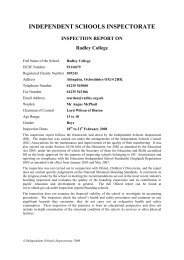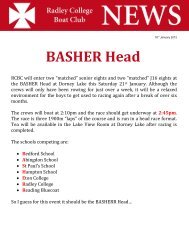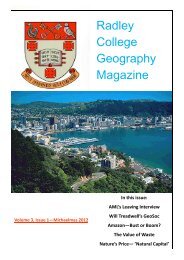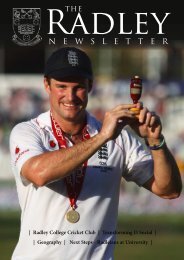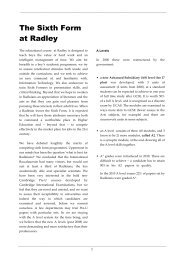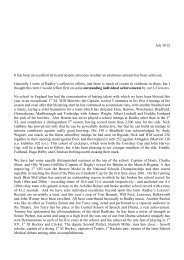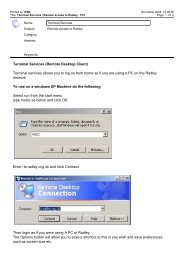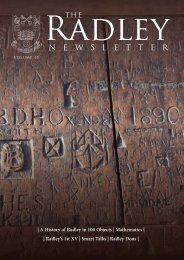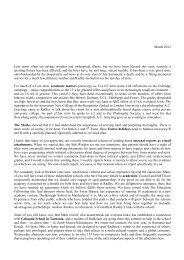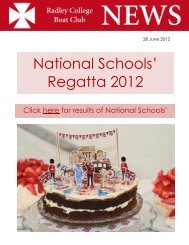N E W S L E T T E R - Radley College
N E W S L E T T E R - Radley College
N E W S L E T T E R - Radley College
Create successful ePaper yourself
Turn your PDF publications into a flip-book with our unique Google optimized e-Paper software.
<strong>Radley</strong><br />
THE<br />
N E W S L E T T E R<br />
VOLUME 13<br />
| Sweeney Todd | IT | Shell Wednesday Activities |<br />
| Politics at <strong>Radley</strong> | Pastoral Care | Radleians |
Sweeney To<br />
the demon barber of flee<br />
At the end of <strong>Radley</strong>’s musical, Sweeney<br />
Todd, packed houses rose spontaneously<br />
to give Jonathan Tarcy, eponymous hero<br />
of this dark Victorian melodrama, a<br />
standing ovation. It was richly deserved;<br />
his range of acting, the power and<br />
precision of his singing, the sheer<br />
believability of his Sweeney, made for<br />
an absolutely compelling performance.<br />
A professional career surely awaits<br />
him. Yet that ovation could as well<br />
have been accorded to Kelly Hampson’s<br />
wonderfully feisty Mrs Lovett, and to<br />
Musical Director Stephen Clarke and his<br />
band who, together, gave such an assured<br />
performance of operatic music which is<br />
more taxing to conduct and to play than<br />
Madame Butterfly.<br />
In truth, it is invidious to bestow the<br />
bouquets on any one or two of these<br />
performers; what lives in the memory<br />
is a great team triumph, nine months<br />
in planning, casting, learning, singing<br />
and choreographing. That measured<br />
campaign meant that there was never<br />
the sense of impending panic which<br />
usually precedes school productions;<br />
from a long time beforehand the Director,<br />
Robert Lowe, ensured that there would<br />
be memorable, assured, performances.<br />
Teamwork was most evident in the<br />
singing; really tricky harmonies<br />
(especially in the Double Quintet)<br />
were handled with assurance. Every<br />
singer sang with ringing articulation<br />
and complete clarity, a reflection of the<br />
popularity at <strong>Radley</strong> of singing, with<br />
over 100 in the Chapel Choir and many<br />
boys having singing lessons. Several<br />
sang show-stopping numbers like Henry<br />
Macpherson whose Tobias performed Mr<br />
Pirelli’s Miracle Elixir, or Head of School<br />
Tommy Siman as Pirelli singing about<br />
the shaving contest. The girls played a<br />
key part, too, auditioned and cast from<br />
all over Oxfordshire. Johanna (Eleanor<br />
Coote) and Mrs Lovett sang their solos<br />
beautifully. Disciplined precision, too, in<br />
the movement; the blocking for set pieces,<br />
like the opening Sweeney Todd number,<br />
was artfully done, and later the bedlam<br />
children, flowing sinuously from their<br />
prison in white, blood stained gowns<br />
across the stage in waves, were both<br />
beautiful and seriously disturbing.<br />
At every turn the watchwords were<br />
energy, commitment, accuracy and<br />
professionalism, and that they should<br />
reach the dramatic heights they did<br />
seemed only appropriate given the<br />
environment in which the cast worked;<br />
the set was superb – thanks to Matt<br />
Barker, Technical Manager – flexible,<br />
dark and sinister, conveying the<br />
2 THE RADLEY NEWSLETTER
dd<br />
t street<br />
disreputable London of back street<br />
barbers and seriously unhealthy pie<br />
shops. And the costumes (thanks to<br />
Lianne Oakley-Rowland) – black, red<br />
(bloodily symbolic) and dirty white,<br />
themed around a Victorian freak circus<br />
– worked convincingly to underscore the<br />
strange and shocking world of a man set<br />
on revenge through tonsorial expertise,<br />
with mortal consequences.<br />
Robert Lowe, the Director, envisioned<br />
and executed the project. He has taken<br />
dramatic standards at <strong>Radley</strong> to giddy<br />
heights, and packed houses of boys,<br />
parents, prep school children and guests<br />
were in no doubt that they had witnessed<br />
something truly memorable in the New<br />
Theatre in early December.<br />
THE RADLEY NEWSLETTER 3<br />
THE RADLEY NEWSLETTER 3
This Cloud<br />
a Silver Li<br />
We now live in a world that is<br />
profoundly shaped by the Digital<br />
Revolution. Nation states, media<br />
empires and high street chains<br />
have all fallen victim to this<br />
Age of Silicon; fibre-optics and<br />
smarter chips conspiring together<br />
to offer ever-faster access to a<br />
virtual world of information and<br />
commercial ease.<br />
It’s a revolution that is built on<br />
the genius of Alan Turing and<br />
driven by the inexorable progress<br />
of Moore’s Law - the law of<br />
diminishing RETURNs, offering<br />
technology that doubles in speed<br />
and halves in price every couple<br />
of years. This is the Law that gives<br />
us new phones every Christmas<br />
and new software by Easter. The<br />
Law that ensures that the latest<br />
hand-held device is a media<br />
centre as much as it is a means of<br />
communication.<br />
This is, of course, a second<br />
American Revolution. Despite the<br />
foundation stones of Bletchley<br />
Park, the Sinclair Spectrum and<br />
the BBC Micro, we British have<br />
again been humbled by our upstart<br />
cousins in the New World - only<br />
this time we had Steve Jobs and<br />
Bill Gates playing the parts of<br />
Benjamin Franklin and George<br />
Washington.<br />
Revolutionary fervour has been in<br />
the air for a while now. As desktop<br />
computers offered us spreadsheets<br />
and word processing, so the<br />
Internet offered us e-mail and the<br />
world-wide-wait. Novel? Certainly.<br />
Interesting? Perhaps. Profound?<br />
No.<br />
But change has come far more<br />
rapidly over the past five years.<br />
Web 2.0 has reinvented the Net as<br />
a genuinely interactive and social<br />
environment. Facebook, LinkedIn<br />
and Twitter are suddenly our<br />
networks of need and BBC iPlayer<br />
our channel of choice. Wikipedia<br />
offers us all the information we<br />
can handle and Wolfram Alpha<br />
offers a computational knowledge<br />
engine that can offer up Poetry<br />
and Chemistry with matchless<br />
ease.<br />
Tablet computing, be it in the<br />
shape of an iPad or an Android<br />
competitor, is now transforming<br />
these technologies into engines<br />
of research that are genuinely at<br />
our beck and call. Never more<br />
than a swipe away, we finally have<br />
the Library of Alexandria at our<br />
finger-tips - and all indexed by<br />
Google.<br />
The implications for education are<br />
equally profound. The ubiquity of<br />
knowledge - and, indeed, the ease<br />
with which it can be retrieved -<br />
calls into question the frameworks<br />
of our test-driven culture. But the<br />
opportunities to do something<br />
genuinely interesting are now<br />
tantalisingly close.<br />
4 THE RADLEY NEWSLETTER<br />
THE RADLEY NEWSLETTER<br />
TER
has<br />
ninG<br />
<strong>Radley</strong> is already<br />
adopting tablet<br />
computing for the<br />
Common Room and<br />
it can only be a matter<br />
of time before all boys<br />
have their own device of<br />
choice. The <strong>College</strong> now<br />
has a wireless network<br />
that extends through<br />
every corridor, classroom<br />
and cubicle - as well as<br />
beyond to the cricket<br />
pitches. We also have webbased<br />
mail, on-line resources,<br />
and a school-wide wiki.<br />
Every classroom has a digital<br />
projector and every department<br />
has access to specialist software<br />
and supporting hardware. Cloud<br />
computing is readily accessible<br />
- with documents and video<br />
available on any device, anywhere<br />
and (almost) anytime.<br />
The next piece of this jigsaw will<br />
be the transition to a devicebased<br />
culture for teaching and<br />
learning. Electronic notes,<br />
shared and reviewed by all in the<br />
class. Electronics books, with<br />
annotations and commentary for<br />
later review. Virtual environments<br />
for design and simulation.<br />
Digital maps for context. Data<br />
sets for analysis. Drawing tools.<br />
Dictionaries. Image banks. Video<br />
capture and conferencing. iTunes<br />
on demand.<br />
Tablet computing offers alwayson<br />
support to education in a way<br />
that laptops always promised but<br />
never quite delivered. Battery life<br />
is a huge boon - these devices will<br />
2030 REM U,V hold the speed of the ball<br />
2040 LET U = 1<br />
2050 LET V = 1<br />
2060 REM P and Q are the vertical positions of the paddles<br />
2070 REM R and S are the speeds of the paddles<br />
2080 LET P = 11<br />
2090 LET R = 0<br />
2100 LET Q = 11<br />
2110 LET S = 0<br />
2120 REM W is a random component to the y-direction speed<br />
2130 LET W = 1<br />
2140 REM Draw the paddles at their initial positions<br />
2150 FOR I = 11 TO 14<br />
2160 PLOT 0, I, “white”<br />
2170 PLOT 24, I, “white”<br />
2180 NEXT I<br />
3000 REM The keyboard input loop<br />
3010 PAUSE 25 + 50 * (5 - LEVEL)<br />
3020 REM Before moving ahead, handle all of the keyboard<br />
buffer<br />
3030 LET C = GET CHAR()<br />
3040 IF C = “” THEN GOTO 4000<br />
3050 IF C = “Q” OR C = “q” THEN LET R = 1<br />
3060 IF C = “A” OR C = “a” THEN LET R = 0<br />
3070 IF C = “Z” OR C = “z” THEN LET R = -1<br />
3080 IF C = “P” OR C = “p” THEN LET S = 1<br />
3090 IF C = “L” OR C = “l” THEN LET S = 0<br />
3100 IF C = “
ACTIV<br />
SHELL WE<br />
Each Wednesday afternoon boys are given a chance to try<br />
something a bit different from their usual academic and<br />
sporting activities. In the Removes, Wednesday activities<br />
come under the banner of CCF and in the Fifths boys help the<br />
local community in various ways. In the Shells however, the<br />
emphasis is on trying something new. This year the options<br />
include:<br />
6 THE RADLEY NEWSLETTER<br />
6 THE RADLEY NEWSLETTER
DNESDAY<br />
ITIES<br />
Art, Backstage, Cooking, Creative Writing , Cricket, Design<br />
Centre, Drama, Gambling for Chocolate, Films. Fitness Training,<br />
Geocashing, Golf, Hockey, Lego Design, Model Planes, Pilates,<br />
Rackets, Scalextric Racing, Sculling, Squash, Tennis, Video<br />
Filming.<br />
THE RADLEY NEWSLETTER 7<br />
THE RADLEY NEWSLETTER 7
Politics a<br />
Many of our boys study Politics in the sixth form – with numbers having increased<br />
from just twenty-six boys in 2004 to eighty-six in 2011 – and they seem to enjoy<br />
it. After all, there are few subjects about which everyone has a view and about<br />
which we can engage in a new debate every day. There are few subjects that are<br />
characterised by such fierce arguments – often from positions held with the vigour<br />
and immutability of religious belief. Politics is the language of global conflicts and<br />
resolutions (although economics may determine the grammatical structure).<br />
well attended by the boys and which<br />
has attracted some very impressive<br />
speakers. Many of the speakers<br />
come from the University of Oxford,<br />
but we have found many speakers as<br />
a result of the generosity of parents<br />
in suggesting contacts for us.<br />
Our subject is not the examination<br />
of current affairs – although current<br />
affairs represent the evidence upon<br />
which our theories are based. Nor is<br />
our subject a classroom equivalent<br />
of a pub argument without the<br />
catalyst of beer. Politics is the<br />
academic exploration of structures<br />
of power – whether it is the<br />
structure of governing institutions<br />
(Parliaments, Presidencies,<br />
Supreme Courts) or the structures<br />
within society that shape these<br />
institutions (religious institutions,<br />
pressure groups, political parties,<br />
corporations as well as social<br />
cleavages based upon ethnicity,<br />
gender, race and so on).<br />
At the end of two years our boys<br />
have the foundations upon which<br />
they can build their understanding<br />
of the state, and of society, and the<br />
ways in which the two interact. If<br />
they take the subject further then<br />
they can examine power structures<br />
on a global scale – which is the<br />
study of International Relations.<br />
They can, for example, study the<br />
overarching ideas that shape our<br />
political beliefs and motivations –<br />
which are the umbrella groupings<br />
we call ideologies.<br />
Politics is complex but the subject<br />
matter is inherently fascinating.<br />
The boys do not leave our course<br />
with their minds changed – it is<br />
not our goal to indoctrinate or to<br />
convert. But they do leave with a<br />
sense of how to think about issues<br />
more deeply. Many of our leavers<br />
are inspired to study the subject at<br />
university level.<br />
As much as we try to cover our<br />
core syllabus or course, we also<br />
strive to explore the questions that<br />
are off-piste and yet fascinating to<br />
discuss in class. We cannot, with<br />
ever-changing subject matter, ignore<br />
the questions that sit just alongside<br />
those topics we are duty-bound to<br />
examine. But we must also ensure<br />
that the boys develop the analytical<br />
rigour needed to examine any<br />
question. They must also learn how<br />
to structure their arguments so that<br />
their writing – and their thinking –<br />
is logical, energetic and compelling.<br />
We try to push all of our boys to<br />
achieve their potential – and do<br />
not believe that our young men<br />
can reach only a C grade – we<br />
push everyone to aim for the top<br />
grades. In 2011 the boys achieved<br />
92% A*/A/B at A level. 32 of our<br />
48 boys gained A and A* grades.<br />
These outstanding results are the<br />
result of hard work by the boys and<br />
dedicated teaching by the dons.<br />
But we focus on much more than<br />
just the results: we aim to instil and<br />
maintain a passion for our subject<br />
and we do so in many ways: we<br />
invite regular speakers to talk to<br />
us about topics that go beyond our<br />
daily studies and in ways that we<br />
have not encountered.<br />
It is almost impossible to find a<br />
newspaper item each day, or a<br />
story on Newsnight each evening<br />
that does not warrant further<br />
exploration. We are very fortunate<br />
to have regular opportunities to<br />
explore ideas and issues outside<br />
of our class teaching. We have a<br />
flourishing Politics Society that is<br />
Just before the October Leave<br />
Away Clive Stafford-Smith (OR),<br />
a human-rights lawyer who has<br />
made representation before the US<br />
Supreme Court on many occasions<br />
(regarding U.K. citizens held in<br />
Guantanamo Bay) addressed the<br />
entire Politics cohort – which<br />
is always one of the best mental<br />
workouts the boys are given. Last<br />
term we invited the Director of the<br />
Rothermere American Institute (Dr<br />
Nigel Bowles, Oxford) - to discuss<br />
the powers of the US President.<br />
He began by noting that the most<br />
powerful man in the world faces the<br />
prospect of presiding over a nation<br />
with 89,000 separate governments<br />
(from school councils to the US<br />
Congress) none of which he controls<br />
(and this includes the Federal<br />
Government). As President Truman<br />
mused as he prepared to vacate<br />
the Oval Office to allow General<br />
Eisenhower to begin his Presidency:<br />
“poor old Ike, he’ll sit here all day<br />
saying ‘do this and do that’ and<br />
nothing will happen. It won’t be a bit<br />
like the army!” Trevor McCrisken,<br />
Professor of International Relations<br />
at the University of Warwick told<br />
us that there were probably as many<br />
as forty nations which had at least<br />
rudimentary nuclear weapons<br />
capacity or the means of acquiring<br />
it within ten years and, as a startingpoint<br />
for discussion, he told the<br />
boys to be afraid. They certainly<br />
paid attention (and were left with<br />
a less sobering message than the<br />
opening gambit would suggest).<br />
Then there is the 6:2 lecture series<br />
– which is not strictly the property<br />
of the Politics Department – but<br />
8 THE RADLEY NEWSLETTER
t <strong>Radley</strong><br />
with a cast list that includes<br />
former Home Secretaries, Select<br />
Committee Chairs, a PM in waiting<br />
(Mr Cameron spoke in 2005) and<br />
leading human rights lawyers. We<br />
were also given the rare privilege<br />
of hosting Radio 4’s Any Questions<br />
in the majestic setting of the New<br />
Theatre.<br />
Yet we continue to foster ambition:<br />
we run extra sessions each Thursday<br />
for the ablest boys (and any who are<br />
keen to attend) in which we take<br />
a theme and explore some more<br />
challenging texts which we discuss<br />
in an informal manner. The new<br />
Michaelmas Term – with the tenth<br />
anniversary of September 11th at<br />
the end of our first teaching cycle –<br />
led to the exploration of American<br />
culture and paranoia. Using the<br />
classic text by American historian<br />
Richard Hofstadter we have begun<br />
to examine whether the US has a<br />
paranoid streak present from its<br />
birth (fear of minorities, fear of<br />
communism, fear of government<br />
itself).<br />
As a department we are keen<br />
to build bridges with other<br />
departments within the school. We<br />
work closely with the Economics<br />
Department who claim that<br />
questions about taxing and<br />
spending are their questions and<br />
not ours (ridiculous of course!). We<br />
also work closely with the History<br />
Department – such subject matter<br />
as the Vietnam Conflict, and more<br />
recent conflicts in which the US<br />
is engaged are best studied with a<br />
solid foundation both in history and<br />
in politics. And, as we toured the<br />
White House during Leave Away<br />
(with the help of a Presidential<br />
insider) we knew that our 6:2<br />
boys would better understand<br />
the myriad ways in which their<br />
academic studies reflect the very<br />
real problems, challenges and<br />
opportunities faced by those we<br />
elect to govern on our behalf.<br />
As we move to a new, purpose-built<br />
department in 2013 we will have<br />
the added benefit of a building that<br />
will better allow us to work across<br />
departments: imagine the use of<br />
multimedia images – projectors,<br />
sound, artwork – focused around<br />
a theme such as the Vietnam<br />
Conflict – the boys studying US<br />
foreign policy in Politics and the<br />
development and passage of the<br />
Conflict in their History lessons. All<br />
this and the prospect of knowing<br />
that when you watch the news and<br />
read the papers you are working at<br />
your politics studies.<br />
Dr Rob McMahon<br />
Head of Politics<br />
THE<br />
RADLEY NEWSLETTER ET<br />
TER 9<br />
THE RADLEY NEWSLETTER 9
Pastora<br />
At the heart of any good boarding school’s Pastoral Care has to be the<br />
notion that everyone plays a role in it, from the in-Social cleaners to the<br />
Tutor, and <strong>Radley</strong> has achieved this in abundance over the years.<br />
The head of the Pastoral Team<br />
in each Social is, of course, the<br />
Tutor and it is his job to make<br />
sure that all his boys feel safe,<br />
happy and involved as well as<br />
to engage all the adults in his<br />
and <strong>Radley</strong>’s pastoral vision.<br />
He achieves this by ensuring<br />
that boys respect and support<br />
one another in all that they do.<br />
The adults play their part by<br />
doing exactly the same and the<br />
common goal is to produce a<br />
home from home atmosphere.<br />
A modern Tutor is on duty<br />
24 hours a day and, bar his<br />
evenings off, every day of the<br />
week. Policies and guidelines<br />
do little to describe accurately<br />
what the Tutor does, since he<br />
must go way beyond those.<br />
Fundamentally, he involves<br />
himself in every facet of a<br />
boy’s life at <strong>Radley</strong> and has the<br />
holistic view of how his boys<br />
are doing and how best to help<br />
them.<br />
The Tutors are ably assisted<br />
by their live-in PHM (Pastoral<br />
House Mistress) whose role<br />
is far more than that of the<br />
Matron in former times. Her<br />
role is a very pro-active one and<br />
she is the lynch-pin in the day<br />
to day running of the Social:<br />
she watches, advises, cajoles,<br />
listens to and empathises with<br />
the boys, just like any mother<br />
would do. In addition, she<br />
maintains standards of good<br />
behaviour, good manners and<br />
personal hygene…as well as<br />
keeping the laundry, cleaning<br />
and cleanliness up to scratch.<br />
Typically, she also runs the<br />
in-Social committee, which<br />
has a representative from each<br />
year group and they gather to<br />
discuss any issues that have<br />
arisen; they may be practical<br />
ones or more esoteric. The<br />
minutes get published to Social<br />
and passed on to the Senior<br />
Master and both Warden<br />
and Sub-Warden. These<br />
Committees are not window<br />
dressing and help, as the other<br />
pan-<strong>College</strong> questionnaires<br />
do, to shape the thinking<br />
about many pastoral matters,<br />
including the provision of<br />
facilities in Socials and the<br />
<strong>College</strong>.<br />
In every Social, there is also a<br />
team of Sub-Tutors. The livein<br />
Sub-Tutor deputises for the<br />
Tutor if away and acts as an<br />
immediate sounding board for<br />
both the Tutor and the boys.<br />
The other live-out Sub-Tutors<br />
may well be Form Masters<br />
to the Lower School and the<br />
move to have all Lower School<br />
Form Masters as in-Social<br />
has done much to elevate<br />
the role; the Form Master is<br />
tasked to oversee the academic<br />
performance of his charges, but<br />
equally takes a broader interest<br />
which extends into the pastoral<br />
more strongly than in the past.<br />
All Dons at <strong>Radley</strong> are expected<br />
to exchange information about<br />
any boys they see in whatever<br />
context and this helps the Tutor<br />
to get his holistic view. It is<br />
a sad (but rather reassuring)<br />
truth that we spend an awfully<br />
large amount of our time<br />
talking about the boys and how<br />
to help them, support them and<br />
motivate them.<br />
A watchful eye is kept on all<br />
Socials by the Pastoral Unit,<br />
which is made up of three<br />
Child Protection Officers,<br />
the Chaplain and the Head of<br />
Shells, whose principal role is<br />
to assist the Tutors with tricky<br />
problems that might involve<br />
several boys or boys from<br />
different Socials; they also check<br />
that punishments are fair and<br />
equitable and train the Mentors<br />
and Prefects centrally.<br />
We must not, however, forget<br />
that all boys play a part in<br />
developing a happy atmosphere<br />
and much reliance is placed<br />
upon the Senior boys who either<br />
act as Mentors (to Shell and<br />
Remove boys) or Prefects to all.<br />
Their ability to pass on things<br />
to the other adults is invaluable<br />
and they have done much to<br />
prevent situations that could<br />
have become more problematic.<br />
Their influence as role models is<br />
self-evident.<br />
Obviously the Medical Centre,<br />
alongside its primary function<br />
as a place to discuss health<br />
issues, does a lot of excellent<br />
pastoral work and several boys<br />
have found it an easy place to<br />
chat and gain confidence.<br />
Inspections over the years have<br />
totally supported what we do<br />
here, but it is what cannot be<br />
assessed or “marked” that has<br />
been <strong>Radley</strong>’s real success. The<br />
atmosphere that is created in<br />
every Social is one where boys<br />
feel they can relax and are at<br />
ease – they know that when<br />
things occasionally go wrong,<br />
the response is quick and<br />
effective.<br />
Seeing the boys together at<br />
Cocoa or at inter-Social events,<br />
one is quick to spot just how<br />
10 THE RADLEY NEWSLETTER<br />
10 THE RADLEY NEWSLETTER
l Care<br />
well the year groups all get on<br />
and how well they mix and<br />
respect the abilities of others.<br />
Good families are keen to be<br />
supportive and enjoy the success<br />
of other members as well as<br />
participate in the obvious fun<br />
that takes place when all are<br />
gathered together and the<br />
Socials try to reflect those aims.<br />
Pastoral Care can be something<br />
of a dry subject on paper and no<br />
amount of description can do<br />
justice to the fun and enjoyment<br />
that boys have in their Socials<br />
and around the <strong>College</strong> – the<br />
Pastoral teams have worked<br />
hard to facilitate this.<br />
Mike Hopkins<br />
Senior Master<br />
THE RADLEY NEWSLETTER 11<br />
THE RADLEY NEWSLETTER 11
Henry McPherson (6.1)<br />
THE DOWNS, D SOCIAL<br />
radleians<br />
My first memory of <strong>Radley</strong> is rather embarrassing. Sitting at the piano<br />
during the Music Scholarships, whilst being drilled with questions<br />
by the staff, I remember, in my confused and generally terrified state,<br />
dropping a pencil inside the nice shiny Steinway Grand – not a great<br />
start, but despite this incident I’m still here to tell the tale. I have to<br />
admit that the first term at <strong>Radley</strong> was a bit of a culture shock; coming<br />
from a mixed day school, having never boarded in my life and being<br />
only 4’11 inches tall, <strong>Radley</strong> seemed to me a large and confusing place.<br />
Thankfully, after about three weeks of total immersion in the system<br />
you completely forget about your worries and the startling height of<br />
the other boys, start acting like you own the place, and throw yourself<br />
into everything at full-throttle, something I hope I have successfully<br />
achieved in all aspects of my life here.<br />
The school has given me opportunities to do things I otherwise would<br />
never have been able to attempt. Starring in stage productions of a<br />
near-professional standard, performing in fantastic ensembles in<br />
concerts, playing sports which are not available anywhere else (for<br />
example real tennis) and learning how to wear a gown properly are<br />
just some of the many experiences I’ve had here. Now in 6.1, or “the<br />
twilight years” as I recently heard it called by a younger boy, I feel even<br />
more so that everything the school has to offer is priceless.<br />
Don’t get me wrong. At points, especially during the A-Level timetable,<br />
it can be very tough. Work, extra-curricular activities, sport and<br />
social commitments dominate the day, but this is something that I feel<br />
<strong>Radley</strong> tailors its pupils to master with great dexterity. In my fourth<br />
year of education here, I feel competent to manage my academic time<br />
efficiently and still enjoy every aspect of life. More importantly, thanks<br />
to this school, the friendships that I’ve made I know I’ll keep for life.<br />
Now, sitting in my room and looking across at the Shell Hall, I can’t<br />
help feeling that the Shells, oblivious to all that is to come, don’t quite<br />
know just how lucky they are.<br />
Charles Saunders (Remove)<br />
WOODLEIGH, H SOCIAL<br />
When I arrived at <strong>Radley</strong> over a year ago, I thought I was a busy student, with<br />
academic and music exhibitions to my name, as well as being very enthusiastic<br />
about sport, and I soon realised that I would have to work extremely hard in<br />
order to fit in all my commitments. Yet little did I anticipate the vast extent of<br />
<strong>Radley</strong> life, in which I would soon be submerged, and I think that my first few<br />
weeks certainly took me by surprise, insomuch as after a couple of days, all I<br />
could answer to “How are you feeling?” was “Tired. Very tired”.<br />
To a lesser extent nowadays than when I began at <strong>Radley</strong>, due entirely to the fact<br />
that I have had five terms in which to settle in, I still feel overwhelmed by the<br />
superb range of activities on offer, and I have been lucky enough to get involved<br />
in a few of these myself. I am a regular attendee at the Creative Writing Group<br />
sessions, which I enjoy greatly, as well as watching inter-social debates as often<br />
as I can. I have been involved in both the Shell and Remove Plays, discovering<br />
the highly professional drama department at <strong>Radley</strong>, as well as being given<br />
the opportunity to take both Maths and French IGCSE early. I have enjoyed<br />
attending the thought-provoking philosophy talks, especially this year, and I<br />
also help produce the student newspaper, “the Chronicle”, which I am loving.<br />
I am currently a cadet in the RAF, and in the Christmas holidays I went to<br />
Wales on the CCF climbing trip, which I enjoyed hugely, and would love to do<br />
again. I find CCF a very interesting activity each week, and one which I hope<br />
to continue next year. In the Easter holidays I am going to Italy on the Classics<br />
trip, and this will be my third holiday abroad with the school in fewer than<br />
two years. All of these activities show the versatility of the <strong>Radley</strong> dons and the<br />
proficiency of the <strong>Radley</strong> community as a whole.<br />
One aspect of <strong>Radley</strong> life that occupies a huge amount of my time is music, and<br />
I spend almost every Central Hour, most mornings, and a lot of evenings in the<br />
music department, as well as taking Music as one of my GCSE choices. I can<br />
think of few things better than spending time among such fabulous musicians<br />
that are present at <strong>Radley</strong>, both dons and senior boys. I have advanced hugely in<br />
my time at <strong>Radley</strong>, taking four ABRSM music exams in five terms, and this is a<br />
credit to the incredible work ethic of the music staff and instrumental dons who<br />
give up their time to offer any possible help.<br />
To this very day, I feel unnaturally busy, but this emphasises some of <strong>Radley</strong>’s<br />
best assets, in which it offers such a range of activities, allows boys to have vast<br />
amounts of freedom and choice, and caters for everyone to an equally high<br />
level, keeping every student involved and happy.<br />
12 THE RADLEY NEWSLETTER<br />
Website: www.radley.org.uk<br />
Admissions enquiries: 01235 543174<br />
admissions@radley.org.uk




